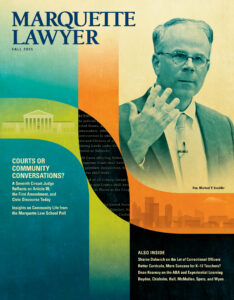Praise for an Exemplar of the Marquette Lawyer—and of a Judge (Seventh Circuit Day, Part 4)

“Bittersweet.” That was the word Judge Diane Sykes used to describe her final days as chief judge of the U.S. Court of Appeals for the Seventh Circuit, including the court’s day of hearings and other events at Marquette Law School on September 25, 2025 (aspects of which were described here, here, and here).
“Sweet” was the only aspect of the word on which the 200 or so people at a reception in Eckstein Hall’s Zilber Forum at the end of the day focused. Perhaps there would have been a concluding reception in any event, but Sykes, L’84, is one of the most distinguished graduates of the Law School. She served as a circuit court judge in Milwaukee County, a justice of the Wisconsin Supreme Court, and, for 21 years (and counting), a judge of the Seventh Circuit. So the conclusion of her chief judgeship, just a few days later, merited marking, even celebration.
Sykes has kept the Law School close to her heart, taking part in programs and helping students for many years, as recently as August 22, 2025, when she administered the future attorney’s pledge to new first-year students—the Class of 2028. In every role she has had, Sykes has carried herself with intelligence, professionalism, grace, and warmth, which was why the reception honoring her was filled with good feeling.


